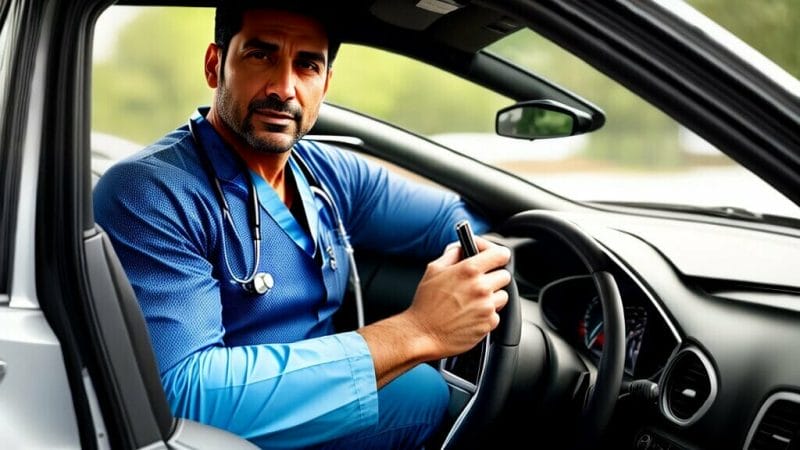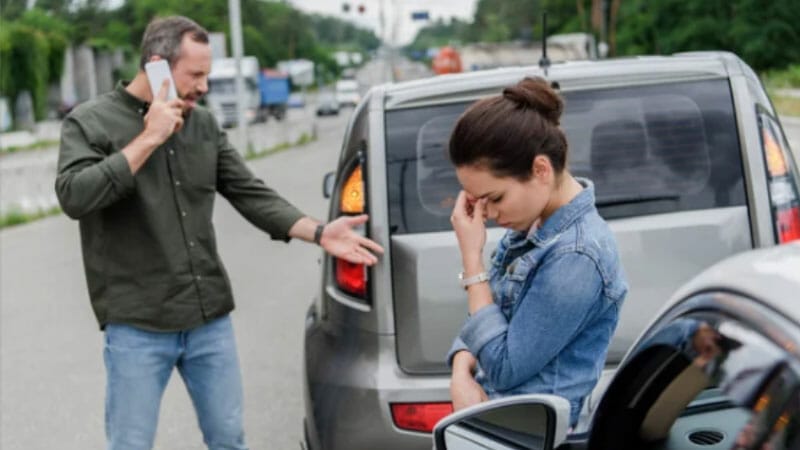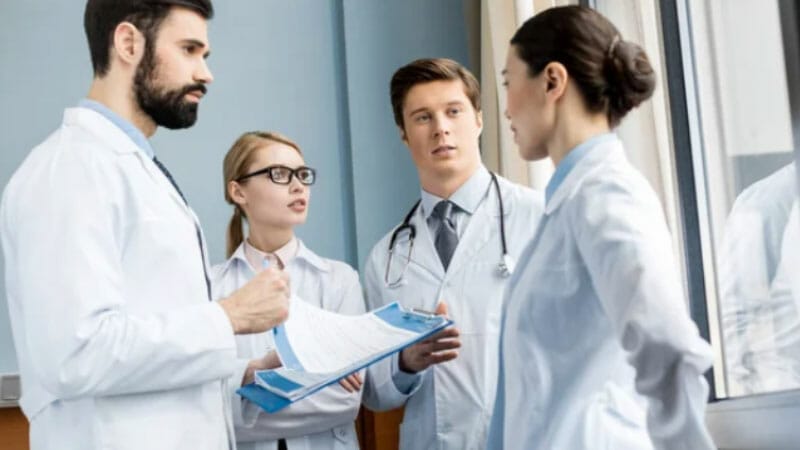After a Car Crash What Happens
Imagine you’re riding in a car, and suddenly, “BANG!”
You’ve been in a car accident.
You might feel scared, shocked, or even a little dizzy.
But what if you feel just fine?
Should you still see a doctor?
The answer is a big YES!
Please note: We are accident doctors who charge you $0 out of pocket for the best after car accident medical care.
You should come in and get treated by us first, and then let us refer you to the best auto accident attorneys in Phoenix or Mesa.
Key Takeaways
Immediate Actions
- Stay calm and assess the situation.
- Call 911 immediately for serious injuries or emergencies.
- Seek medical attention even if you feel fine.
- Don’t drive yourself to the hospital if injured.
Medical Considerations
- Hidden injuries may not show immediate symptoms.
- Internal injuries and whiplash can develop hours or days later.
- Documentation from early medical visits is crucial.
Emergency Room Indicators
- Head, neck, or back injuries require immediate ER attention.
- Severe pain or trouble breathing.
- Dizziness or confusion.
- Profuse bleeding or deep cuts.
- Suspected broken bones.
Legal and Documentation
Personal injury lawyers can assist with:
- Understanding accident circumstances.
- Managing insurance claims.
- Handling medical bill payments.
- Legal representation if needed.
- Keep detailed records of all medical visits and treatments.
- Initial legal consultations are typically free.
Safety Protocols
- Listen to first responders and police.
- Accept medical transport if recommended.
- Don’t argue with authorities at the scene.
- Ensure proper medical documentation from the start.
- Follow up with recommended specialist appointments.
Why Seeing a Doctor is Important
Car accidents can be horrifying and confusing.
Sometimes, you might feel perfectly fine right after the crash, but that doesn’t mean you’re not hurt.
Some injuries take time to show up, and you might only feel them later.
That’s why it’s super important to see a doctor, even if you think you’re okay.

Here’s what you need to know:
1. You Might Have Hidden Injuries:
Sometimes, injuries like sprains, strains, or even broken bones can be hidden.
You might not feel them immediately, but a doctor can find problems and help you heal.
2. You Could Have Internal Bleeding:
This sounds scary, but don’t worry! Internal bleeding is when something inside you is hurt and might not show any signs at first.
A doctor can check for this and ensure you’re safe.
3. Whiplashes Can Be Tricky:
Have you ever heard of a whiplash? It’s when your neck moves back and forth fast.
It can happen in a car crash and might not hurt at first.
But a doctor can check for it and help you feel better if you have one.
What to Do After a Car Accident.
So, what should you do if you’re in a car accident?
Here’s a simple plan:
1. Stay Calm:
Take a deep breath and stay calm.
It’s normal to feel scared, but staying calm can help you think clearly.
2. Call for Help if Needed:
If you or someone else is hurt, call for help immediately.
3. See a Doctor:
Even if you feel fine, see your doctor.
They will check you over and make sure you’re okay.
They know what to look for and can help you feel better if you’re hurt.

Remember, It’s Always Good to get Checked Out!
Car accidents can be shocking; sometimes, you might not know if you’re hurt.
That’s why it’s always a good idea to see a doctor.
They’re like detectives for your body and can determine if anything is wrong.
So, even if you think you’re just fine, see a doctor.
It’s the best way to ensure you’re okay and help you feel better if you’re not.
Remember, it’s always better to be safe than sorry.
When to call 911 or go to the Emergency Room after a Car Accident
Car accidents can be different every time.
Sometimes, they’re just little bumps, and sometimes, they’re more serious.
But how do you know when to call 911 or go to the emergency room?
Let’s find out!

When to Call 911
Calling 911 is for when things are bad like:
1. Severe Pain: If you or someone else is hurting a lot, it’s time to call 911.
2. Trouble Breathing: If it’s hard to breathe, that’s a sign to call for help.
3. Feeling Weak or Dizzy: If you feel like you might faint, it’s better to call 911.
4. Lots of Bleeding: If there’s a lot of blood, don’t wait. Call for help right away.
5. Deep Cuts or Broken Bones: If you see deep cuts or think a bone might be broken, call 911.
When to Go to the Emergency Room.
Sometimes, you might not need to call 911, but you still need to go to the emergency room.
Here’s when:
1. Head, Neck, or Back Injury:
If you hit your head, neck, or back hurts, it’s time to go to the emergency room.
2. Feeling Confused:
If you feel mixed up or confused, that’s a sign to go to the hospital.
3. Any Other Worrying Symptoms:
If something else feels wrong, trust your feelings and go to the emergency room.
What NOT to Do.
If you need to go to the emergency room, here’s what NOT to do:
1. Don’t Drive Yourself:
If you’re hurt, don’t try to drive yourself to the hospital.
Ask someone else to drive you or call for an ambulance.
Remember, it’s important to prioritize your own safety and well-being in an emergency situation.
Driving yourself while injured could put yourself and others at risk.
Instead, make sure to follow safe driving tips and rely on someone else to transport you to the hospital. If you’re unable to find someone to drive you, consider calling for an ambulance to ensure you receive the medical care you need. Remember, following safe driving tips can help prevent accidents and injuries for everyone on the road.
2. Don’t Argue with the Police:
If the Police say you need an ambulance, listen to them.
They know what they’re talking about and want to help you.
It’s Okay to Ask for Help.
Sometimes, it’s hard to know what to do.
And that’s okay!
If you’re unsure, asking for help is always okay.
You can speak to an adult or a police officer or call 911 and ask them what to do.
Remember, asking for help if you’re unsure is always better.
People want to help you, and it’s okay to ask.
Car accidents can be scary, but knowing when to call 911 or go to the emergency room can help you stay safe.
Trust your feelings, ask for help if needed, and don’t be afraid to call 911 or go to the emergency room if something feels wrong.
The Super Team of Doctors Who Help After Car Accidents.

1. Emergency Room Physician:
The First Responder – If you go to the emergency room, this doctor is the first to see you.
They’re like the team’s captain, ensuring you get the help you need right away.
2. Radiologist:
The Picture Taker – This doctor takes pictures of the inside of your body, like x-rays and scans.
They help the other doctors see what’s going on inside you.
3. Trauma Surgeon:
The Fixer-Upper – If something is hurt, this doctor might need surgery.
They’re experts at putting things back together.
4. Orthopedic Surgeon:
The Bone Doctor – This doctor knows what to do if you break a bone or hurt your joints.
They’re like the body’s builders, ensuring everything is strong and sturdy.
5. Neurologist or Neurosurgeon:
The Brain and Nerve Experts – These doctors know all about the brain and nerves.
They’re the ones to see if you hit your head or have tingling in your fingers.
6. Burn Specialist:
The Firefighter – If you get a burn, this doctor knows how to cool it down and help it heal.
They’re like firefighters for your skin.
7. Plastic Surgeon:
The Artist – An injury might sometimes leave a scar or change your appearance.
This doctor is like an artist, helping you look and feel like yourself again.
8. General Surgeon for Internal Injuries:
The Inside Expert – If something inside you gets hurt, like your stomach or liver, this doctor knows how to fix it.
They’re experts at helping the inside of your body.
9. Physical, Occupational, and Vocational Therapist:
The Coaches – These helpers teach you exercises and activities to get strong again.
They’re like coaches, cheering you on and helping you get back to doing what you love.
They All Work Together.
All these doctors work together in tandem.
They talk to each other and make a plan to help you feel better.
Each has a particular job, but they all work together for you.

What Happens If My Doctor Sends Me to a Specialist After a Car Accident?
Sometimes, after a car accident, your regular doctor might want you to see a special kind of doctor called a “specialist.”
What Is a Specialist?
A specialist is a doctor who knows a lot about one specific part of the body or one particular kind of problem.
For example, you might see an orthopedic surgeon if you hurt your knee.
That’s a doctor who knows a lot about bones and joints.
Why Would You See a Specialist?
Here’s why your regular doctor might send you to see a specialist:
1. To Check for Something Specific:
Maybe your regular doctor wants to make sure you don’t have a specific injury. The specialist can check for that.
2. To Get a Closer Look:
Sometimes, a specialist has special tools and tests to examine a problem.
3. To Get Expert Help: If you have a tricky injury, a specialist might know how to help you feel better.
What Happens When You See a Specialist?
Seeing a specialist is like seeing your regular doctor but with a few extra steps.
Here’s what might happen:
1. Talking and Checking:
The specialist will talk to you and check the part of your body that’s hurt.
They might ask you to move or touch it to see how it feels.
2. Special Tests:
The specialist might do some special tests, like x-rays or scans, to see inside your body.
3. Making a Plan:
If the specialist finds something that needs to be fixed, they’ll make a plan with your regular doctor to help you get better.
What Happens After You See the Specialist?
After you see the specialist, here’s what might happen:
1. Going Back to Your Regular Doctor:
The specialist will tell your regular doctor what they found and what needs to be done.
2. Getting Treatment: You might need to take medicine, have surgery, or do special exercises to get better.
3. Getting Better Together:
Your regular doctor and the specialist will work together to help you feel better.
Seeing a Specialist Is a Team Effort.
Seeing a specialist is like having a team of doctors working together to help you.
Your regular doctor, the specialist, and even others might work together to ensure you get better.
So, if your doctor ever says you need to see a specialist, don’t worry! It’s another way to ensure you get the best care possible.
It’s all about working together to help you feel your best after a car accident.
You’re in good hands with your doctor team!
Who Helps After the Doctors? Meet the Car Accident Injury Lawyers!
After a car accident, doctors are there to help you feel better.
But what about your car, or if you need help paying hospital bills?
That’s when a special helper called a “personal injury lawyer” comes in.
What Is a Personal Injury Lawyer?
A personal injury lawyer is a helper for people who get hurt in accidents.
They know all about the rules and laws that help keep people safe.
They can help you determine what to do next if something goes wrong in an accident.
How Can a Personal Injury Lawyer Help You?
Here’s how a personal injury lawyer can help if you’re in a car accident:
1. Understanding What Happened:
They’ll listen to your story and help you understand what happened in the accident.
2. Talking to Other People:
They might need to talk to the police, the other driver, or doctors to learn more.
3. Helping with Money Stuff:
If you need to pay for things like fixing your car or going to the hospital, they can help you figure out how.
4. Being Your Friend in Court: If you need to go to court, they’ll be right there with you, like a friend who knows all the rules.
When Should You Talk to a Personal Injury Lawyer?
If you’re in a car accident and worried about things like your car, money, or what to do next, it might be a good time to talk to a personal injury lawyer.
Your personal injury lawyer can help you navigate the legal process and ensure you receive the compensation you deserve.
They can also guide you on how to deal with insurance companies and if you were driving a rental car, you need to know your rental car rights.
Having someone on your side who can advocate for you and protect your best interests during this challenging time is important.
They’re there to help you, just like the doctors.
How to Find a Personal Injury Lawyer.
Finding a personal injury lawyer is easy!
The lawyers we refer to you talk to you for free to see if they can help.
And they are the best in the business too.

They’re like guides who know the way, helping you through a confusing time.
So, remember, if you’re ever in a car accident and need help with things like your car or money, a personal injury lawyer might be just the helper you need.
They’re there to listen, understand, and help you find your way.
With doctors to help your body and lawyers to help with everything else, you’ve got a whole team of helpers ready to be there for you!
FAQs
#1. Why is it important to see a doctor even if I feel fine after a car accident?
A: It’s essential to see a doctor because some injuries may not immediately show symptoms. A doctor can detect hidden injuries and ensure proper treatment.
#2. When should I call 911 after a car accident?
A: Call 911 if you experience severe pain, trouble breathing, weakness, dizziness, profuse bleeding, deep cuts, broken bones, or other urgent symptoms.
#3. What happens if my regular doctor sends me to a specialist after a car accident?
A: A specialist will perform specific tests or consultations to explore or rule out certain conditions. They will then report back to your regular doctor with findings and recommendations for treatment.
#4. What types of doctors might treat me after a car accident?
A: Depending on your injuries, you might be treated by emergency room physicians, radiologists, trauma surgeons, orthopedic surgeons, neurologists, burn specialists, plastic surgeons, general surgeons, and therapists.
#5. What do personal injury lawyers do, and how can they help after a car accident?
A: Personal injury lawyers help with legal aspects after an accident, such as understanding what happened, talking to other parties, helping with financial matters, and representing you in court if needed.
#6. Should I go to the emergency room even for minor symptoms after a car accident?
A: Yes, symptoms like head, neck, or back injury, confusion, or any other worrying signs should prompt a visit to the emergency room.
#7. What is the role of a radiologist in treating car accident injuries?
A: A radiologist takes pictures of the inside of your body, like X-rays and scans, to help other doctors see what’s happening inside you.
#8. How do I find a personal injury lawyer if I need one after a car accident?
A: You can find a personal injury lawyer by looking online, in the phone book, or by asking a grown-up for assistance. Some lawyers offer free initial consultations.
#9. What should I NOT do if I need to go to the emergency room after a car accident?
A: You should not drive yourself to the hospital if you’re hurt and should not argue with the police if they say you need an ambulance.
#10.What kind of specialist might I see if I have a knee injury from a car accident?
A: If you have a knee injury, you might see an orthopedic surgeon, a specialist who knows a lot about bones and joints, to evaluate and possibly treat the injury.

